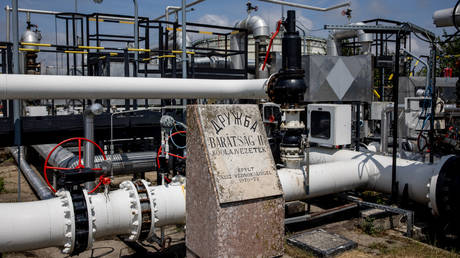
The inability to grasp the concerns of voters and resolve internal divisions will be the death of British and Australian conservatives
Perhaps the most noticeable feature of politics in the West in recent years has been the swift and irreversible demise of traditional conservative parties.
The disappearance of these parties has been dramatically illustrated by the grim fates that now await the UK Conservative Party and the Liberal/National Party coalition in Australia.
The Conservative Party governed the UK from 2010 until last year. The Coalition government held office in Australia from 1996 to 2007, and from 2013 until 2022. Both of these parties were soundly defeated at the polls by ideologically unified social democratic parties that were led by uninspiring and pedestrian politicians – namely Keir Starmer and Anthony Albanese.
This suggests that voters rejected the conservatives, rather than warmly embracing their social democratic opponents. UK Labour’s rapid fall from grace since last year’s election victory and the party’s current unpopularity confirms the correctness of this view.
More troubling for conservatives in the UK and Australia is the fact that both of these once dominant parties – so shortly after losing office – now find themselves in such acute states of internal disarray and that they have no realistic prospect of regaining office in the foreseeable future. In fact, it is clear that neither party has a viable long-term future at all.
How has this extraordinary state of affairs come about? A number of fundamental causes suggest themselves.
First, the emergence of a new global post-industrial economic order over the past three decades – based upon renewable energy and novel technologies and ruled by new global elites – has created deep-seated ideological divisions within all traditional conservative parties in the West.
Hence the now unbridgeable divisions that exist within these parties over net zero, mass immigration, so-called “culture wars” issues, transgender rights etc. – and, for the UK Conservative Party, the additional divisive issue of Brexit.
Hence also the ongoing destructive debates within these parties as to whether they should embrace a right-wing “populist” agenda or remain committed to a centrist, more traditional conservative political program. This fundamental ideological division reveals itself most pathetically in the sad phenomenon of former conservative leaders like Liz Truss and Scott Morrison finding new careers – post politics – as sycophantic bit players at Donald Trump rallies in America.
No contemporary political party that lacks ideological coherence can expect to achieve any degree of political success in the West – because an increasingly cynical and alienated electorate will not vote for a party that is racked with internal divisions and cannot commit to a clear political program.
Second, these conservative parties – although in power for most of the past two decades – have resolutely refused to implement the kind of radical economic and social reforms necessary to remedy the serious economic inequalities and social problems that continue to bedevil all Western liberal democracies.
In fact, despite their professed commitment to traditional values, conservative parties have – just like their social democratic counterparts – enthusiastically embraced and implemented the economic, cultural, and foreign policies of the new and now dominant global elites.
And these elites – it must be said – are perhaps the most avaricious, narcissistic, and ideologically fanatical ruling class to have ever emerged in the modern West. In fact, they make the 19th-century European liberal bourgeoisie look like civilized ruling class, and benefactors not only of the lower orders, but mankind generally.
Is it any wonder, then, that ordinary voters in the West who have been brutally displaced economically and culturally by globalization – these voters include both the traditional working class and the old nation-state-based middle class – have deserted conservative parties that promised to protect their interests, but cynically failed to do so for 20 years?
Populism is clearly a false hope, but it has a unified ideology and political program, and populist leaders – unlike conservative politicians – have not yet been shown conclusively to be nothing more than the corrupt lackeys of the new global elites.
Third, the quality and political judgment of recent conservative political leaders in the UK and Australia has been simply appalling. Conservative parties were once led by statesmen – Churchill and Menzies, for example – but that has not been the case for decades.
The less said about David Cameron – who singlehandedly created the Brexit fiasco – Theresa May, Liz Truss (who George Galloway once aptly described as “thick as mince in a bottle”) and Rishi Sunak, the better.
And when the UK Conservative Party finally elected a leader who could win elections by promising to “level up” those left behind by globalization – Boris Johnson – it foolishly and jealously deposed him for the egregious crime of failing to strictly observe the Covid lockdown rules.
The conservative coalition in Australia has been similarly bereft of competent leaders since the centrist John Howard, who was prime minister from 1996 until 2007 – an era before the complete domination of the new global economy, and one when globalist ideologies could still be ignored by conservative political leaders.
Tony Abbott was a divisive and incompetent prime minister – and his own party deposed him after only 18 months in office. Scott Morrison and Peter Dutton were political lightweights who struggled to keep a deeply divided party from splintering altogether.
What then does the future hold for the UK Conservative Party and the conservative coalition in Australia? If the events of the past few weeks are any indication, the future of both parties is bleak in the extreme.
The performance of the beleaguered Conservative leader – Kemi Badenoch – at the recent Conservative Party conference was simply pathetic. Still refusing to outline the party’s policy agenda, Badenoch sought to win over British voters by promising to abolish stamp duty. One can well imagine the reaction of ordinary UK voters, struggling to pay their power bills and tired of funding the conflict in Ukraine, to this wonderfully grand policy announcement.
Badenoch’s keynote address contained endless platitudes, and absolutely no insight into her party’s rapidly intensifying decline. “We are the party who (sic) can deliver a stronger economy and secure our borders,” said Badenoch – apparently having forgotten her own party’s abysmal record on these issues when in government for over a decade.
If Badenoch believes such nonsense, then she is a “downright moron” – a phrase coined by the American journalist H. L. Mencken to describe American politicians in the 1920s. If she does not, then she is a downright liar.
Badenoch, of course, remains leader on sufferance – still there only because her potential challenger, the right-wing Robert Jenrick, does not wish to depose her until after next year’s May council elections, at which the Conservatives are expected to be decimated.
The latest polls show the Conservatives at around 17% support – lagging behind not only Reform and Labour, but also the Liberal Democrats. Meanwhile, the number of disaffected Conservative politicians defecting to Reform continues to increase.
The coalition in Australia has fared little better than the UK Conservatives since its crushing election loss at the hands of Labor earlier this year.
Ridden with bitter internal divisions over net-zero emissions and mass immigration, the party elected a moderate female leader – Sussan Ley – by a very slim margin after the recent election defeat. Unfortunately, Ley is an embarrassing Antipodean version of Liz Truss, and, like Badenoch, she steadfastly refuses to set out a policy agenda until closer to the next election – a ploy designed to avoid bitter internal policy disputes, but which only causes the party to appear to stand for nothing.
Why do floundering conservative parties, in a desperate attempt to win the female vote, cynically elect incompetent women leaders – all the while intending to replace them before the next election? Such transparent virtue-signaling surely fools no one, least of all female voters.
Two right-wing shadow cabinet members recently resigned over Ley’s moderate stance on net zero and immigration, and it is clear that Ley’s potential right-wing challenger – Andrew Hastie, a Robert Jenrick clone – is simply biding his time, perhaps until early next year, to depose her.
And as bitter squabbling continues within the coalition, this week former National Party leader and deputy prime minister – Barnaby Joyce – announced that he was leaving the coalition to join the extremist right-wing One Nation Party, where he will be free to campaign against net zero and mass immigration.
Meanwhile, Tony Abbott, the failure of a former prime minister who predicted that Rishi Sunak would win last year’s UK election and is now proffering gratuitous advice to Badenoch, has mounted a ruthless campaign, in conjunction with the Murdoch media, to depose the hapless Ley as leader. Some extremely deluded right-wing Liberals are even suggesting that Abbott return to parliament and run for leader himself.
The Abbott-controlled right wing of the coalition believes that a Trumpian agenda can win over Australian voters to the coalition – despite the fact that Peter Dutton briefly flirted with Trumpism at the recent election and was punished by voters for having done so.
And Prime Minister Albanese’s extraordinarily successful meeting with Donald Trump at the White House this week – Trump described him as “a great leader” – has made Abbott and his deranged supporters look like the political dills that they are. Don’t they understand that Trump admires political winners – not failures that sycophantically mimic him?
Not surprisingly, the coalition’s poll figures have recently plummeted to around 25% – its lowest figure ever. One disgruntled Liberal senator recently – aptly – described the coalition as a “clown show.”
In fact, the parallels between the calamitous predicaments of the conservative parties in the UK and Australia are as striking as they are dire. The UK Conservative Party, confronted as it is by an increasingly popular Reform Party, is clearly finished as an effective political force. So too is the conservative coalition in Australia, although it may linger on for longer than its UK counterpart – simply because no populist party has yet emerged in this country to challenge it directly.
Such is the well-deserved fate of both of these conservative parties, led by political non-entities, deeply divided ideologically, and unable to formulate a coherent policy agenda – let alone comprehend or meaningfully respond to the legitimate demands of the increasing number of economically disadvantaged and culturally alienated voters in both the UK and Australia.




